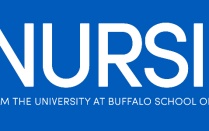Embracing the DNP
Building the Future of Nursing Today
Published September 1, 2015 This content is archived.
University at Buffalo School of Nursing’s Post-Master’s DNP Program is designed for full-time employed specialty-certified advanced practice nurses with a desire to improve clinical outcomes via application of the latest evidencebased science and innovation in practice. The program builds on the clinical preparation of NPs, CNSs and CRNAs, supporting professional nurses in their endeavor to reach their full potential.
Why bother with a DNP program? First and foremost is real world impact. The Institute of Medicine’s (IOM) 2010 report, “The Future of Nursing: Leading Change, Advancing Health,” recognizes the vital role nurses play in the restructuring of health care in the United States following the Affordable Care Act. With more than three million nurses comprising the largest segment of the health care workforce, it is imperative that nurses progress to the highest level in academics and clinical practice. To this end, IOM recommends nurses engage in lifelong learning and “prepare to lead change to advance health” – with an aspiration of doubling the number of nurses holding a doctorate by 2020.

Preparedness for leadership is fundamental in providing quality clinical care and advancing the field while navigating the U.S.’s evolving health care landscape – nurses are on the front lines and are often the individuals best positioned to identify patient care deficits and needs. DNP preparation keeps nurses abreast of exciting innovations in research and practice.
The rapid expansion and increasing complexity in health care especially affects future nurse anesthetists – the Council on Accreditation (COA) of Nurse Anesthesia Educational Programs indicates DNP education is a requirement for CRNA practice by 2025.
Second is enduring impact on tomorrow’s nurses. Doctorate-prepared nurses fulfill an array of needs in not just clinical practice, but also in educating and mentoring the next generation of nursing professionals. In fact, hundreds of nursing schools identify a shortage in doctorate-prepared nurses as a major faculty recruitment issue. According to the American Association of Colleges of Nursing (AACN), 68.2 percent of 714 schools surveyed for the academic year 2014-2015 reported a limited pool of faculty with doctorates, and 30.4 percent reported difficulty finding faculty willing/able to teach clinical courses. This need is further exaggerated by reported teaching responsibilities and degree requirements for vacant full-time faculty positions – 69.2 percent require both clinical and classroom teaching, and a whopping 89.6 percent require or prefer an earned doctorate in nursing or a related field.
Last is your wallet. ADVANCE for Nurse Practitioners’ 2011 survey indicates DNPprepared NPs earn about $8,500 more per year than NPs with a master’s degree. If this difference seems miniscule, consider this – with the AACN recommending the DNP as the educational requirement for state licensure and APRN national certification, coupled with the fact that the “changing demands of this nation’s complex health care environment require the highest level of scientific knowledge and practice expertise to assure quality patient outcomes,” the demand for DNP prepared nurses is increasing and will continue to do so.
UB SON’s Post-MS DNP is uniquely positioned to help NPs achieve higher levels of education and continue to flourish in their careers by advancing clinical practice outcomes. Some prime examples of the first-rate work of UB SON DNP students include Capstone Projects such as Lisa Berlinghoff’s “Survey of Medication Injection Safety Knowledge and Practices Among Certified Registered Nurse Anesthetists”; Lou Palowski’s “Nursing Students Knowledge and Attitudes Regarding the Patient in Pain”; and Adam Gelb’s “Ultrasound Guided Identification of the Axillary Component of the Brachial Plexus.” These students, along with other fellow DNP students, were conferred their DNP in 2015.
This part-time program offers the only distance learning post-master’s DNP among New York State public universities, allowing already established professionals to seamlessly transition back to school while maintaining employment.
“Being able to access course work at any time of the day from any location in the world has made our program unique and accessible for students across the globe,” explains Assistant Dean for MS/DNP Programs and Clinical Professor Tammy Austin-Ketch, PhD, RN, FNP-C, FAANP. “The many and varied work and life experiences of our diverse DNP students provide rich perspectives on patient care, administrative experiences, as well as past experiences with problem solving solutions for complex patient situations that serve to improve patient and quality care outcomes.”
UB SON also offers a post-baccalaureate to DNP program designed for completion in three years of full-time study or up to seven years of part-time study – new graduates are also welcome to apply. In addition, the Early Assurance Program provides an early acceptance opportunity to well-qualified undergraduates focused on becoming advanced practice nurses.
- SARAH GOLDTHRITE
Read More UBNursing
Current Issue
Past Issues
We want to hear from our incredible alumni. Whether you live in Western New York or anywhere else in the world, stay in touch! Send us a class note.

